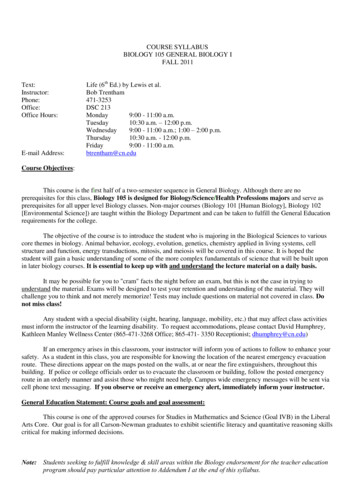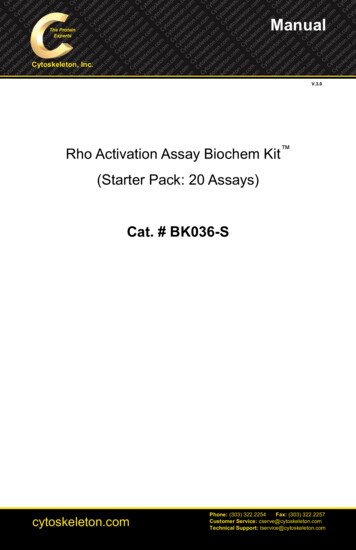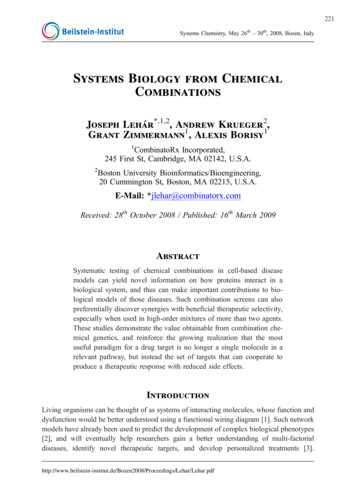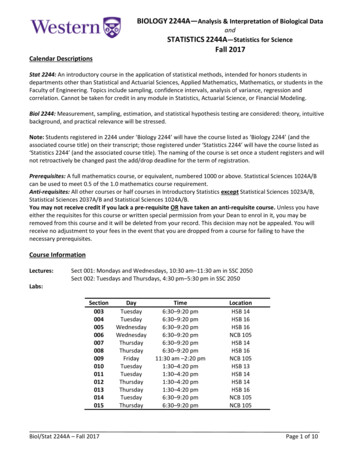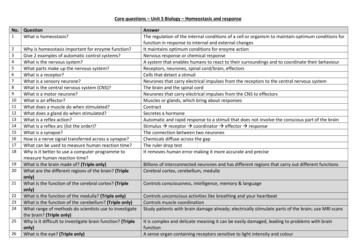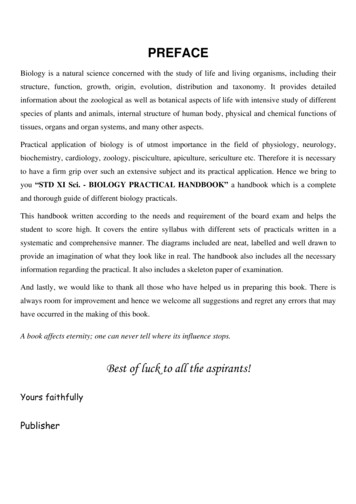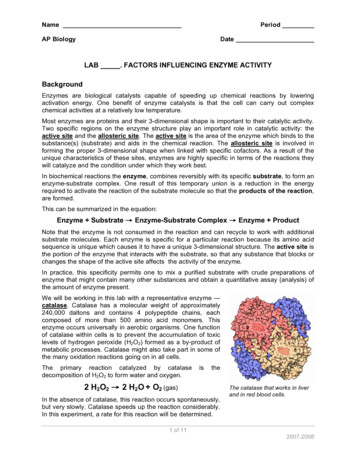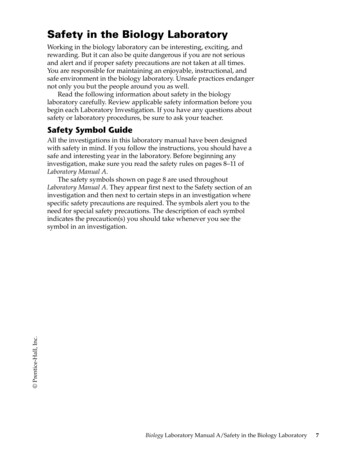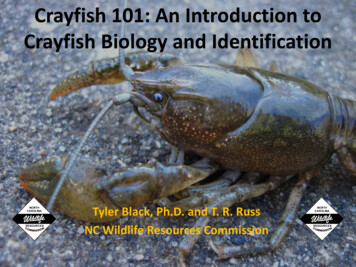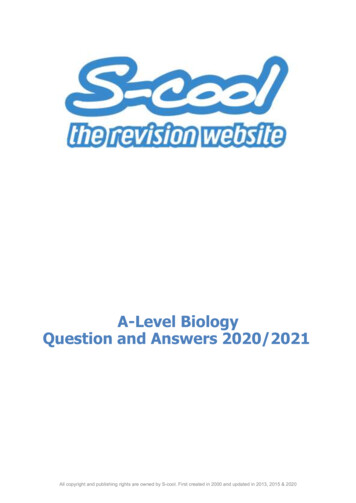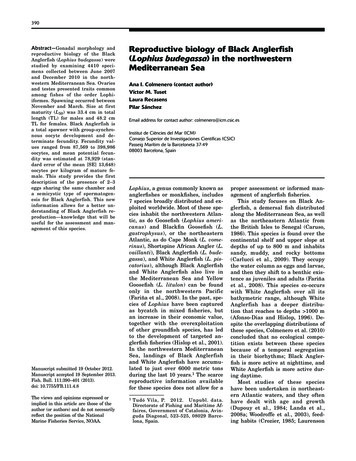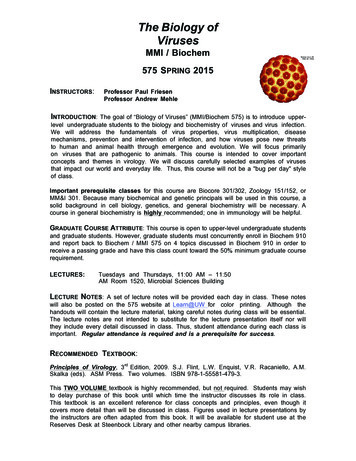
Transcription
The Biology ofVirusesMMI / Biochem575 SPRING 2015INSTRUCTORS:Professor Paul FriesenProfessor Andrew MehleINTRODUCTION: The goal of “Biology of Viruses” (MMI/Biochem 575) is to introduce upperlevel undergraduate students to the biology and biochemistry of viruses and virus infection.We will address the fundamentals of virus properties, virus multiplication, diseasemechanisms, prevention and intervention of infection, and how viruses pose new threatsto human and animal health through emergence and evolution. We will focus primarilyon viruses that are pathogenic to animals. This course is intended to cover importantconcepts and themes in virology. We will discuss carefully selected examples of virusesthat impact our world and everyday life. Thus, this course will not be a "bug per day" styleof class.Important prerequisite classes for this course are Biocore 301/302, Zoology 151/152, orMM&I 301. Because many biochemical and genetic principals will be used in this course, asolid background in cell biology, genetics, and general biochemistry will be necessary. Acourse in general biochemistry is highly recommended; one in immunology will be helpful.GRADUATE COURSE ATTRIBUTE: This course is open to upper-level undergraduate studentsand graduate students. However, graduate students must concurrently enroll in Biochem 910and report back to Biochem / MMI 575 on 4 topics discussed in Biochem 910 in order toreceive a passing grade and have this class count toward the 50% minimum graduate courserequirement.LECTURES:Tuesdays and Thursdays, 11:00 AM – 11:50AM Room 1520, Microbial Sciences BuildingLECTURE NOTES:A set of lecture notes will be provided each day in class. These noteswill also be posted on the 575 website at Learn@UW for color printing. Although thehandouts will contain the lecture material, taking careful notes during class will be essential.The lecture notes are not intended to substitute for the lecture presentation itself nor willthey include every detail discussed in class. Thus, student attendance during each class isimportant. Regular attendance is required and is a prerequisite for success.RECOMMENDED TEXTBOOK:Principles of Virology, 3rd Edition, 2009. S.J. Flint, L.W. Enquist, V.R. Racaniello, A.M.Skalka (eds). ASM Press. Two volumes. ISBN 978-1-55581-479-3.This TWO VOLUME textbook is highly recommended, but not required. Students may wishto delay purchase of this book until which time the instructor discusses its role in class.This textbook is an excellent reference for class concepts and principles, even though itcovers more detail than will be discussed in class. Figures used in lecture presentations bythe instructors are often adapted from this book. It will be available for student use at theReserves Desk at Steenbock Library and other nearby campus libraries.
EXAMS:All examinations must be taken in this course. Make-up exams are discouraged and will begiven ONLY under extraordinary circumstances. Missed exams will be allowed only if writtennotice of a conflict or illness is given to the instructor 24 hours prior to the exam. There willbe NO early final exams given in this course.HONORS OPTION: Make an appointment with Dr. Mehle if interested.GRADES:1.2.3.A student’s final grade in this upper-level course will be based on the following:POINTSTwo in-class one-hour exams (100 points each)Final exam (50% comprehensive)Problem setsTOTAL:20010030330EXAM REGRADING POLICY: Answer keys to the exams (and problem sets) will be postedon the MMI/Biochem 575 website at Learn@UW. If you have questions concerning a grade inthis course, see your TA promptly. If you desire to have an exam regraded, you must return it toone of the TAs or the instructor within one week of taking the exam. Your graded exam mustbe accompanied with description of the perceived problem, which is to be written on the frontpage of the exam. In such cases, the entire exam will be regraded.PROBLEM SETS: Several problem sets will be provided for each of the three sections of thecourse (Parts 1, 2, and 3). Printed copies will be provided in class and electronic copies will beavailable for downloading from the MMI/Biochem 575 website at Learn@UW. Each problem setmust be completed by each individual student and returned to the instructor on the indicateddue date in order to receive full credit (see Exams and Grading). Although students areencouraged to work in groups, identical group answers are NOT ACCEPTABLE. Because theproblem sets are designed to facilitate student understanding of lecture information, they will beexamined by the instructors but not graded. The TAs or instructors will discuss the problems inclass or at discussion sessions.TAS AND DISCUSSIONS: There are no formal discussion sessions for this upper-levelcourse. Nonetheless, your teaching assistants (TAs) will answer questions about the lecturematerial and problem sets at weekly review sessions scheduled for Mondays, 4:00 PM inRoom B105, R.M. Bock Laboratories (1525 Linden Drive). Your TA will also take officeappointments should you desire to meet individually to discuss class material. The TAs arePh.D. students, who are studying virology for their thesis work. They are experts willing to helpyou succeed in this virology course. We highly recommend that students take advantage ofthe knowledge and experience of the TAs.INSTRUCTORS:Paul FriesenOffice:Phone #:Email:Office Hours:Andy MehleOffice:Phone #:Email:Office Hours:Professor – Institute for Molecular Virology &Dept. of BiochemistryRm. 721 R.M. Bock Labs262-7774pfriesen@wisc.eduBy appointmentAssistant Professor – Dept. of Med. Microbiology& ImmunologyRm. 3305 Microbial Sciences Building263-1978amehle@wisc.eduBy appointment
COURSE SCHEDULE:Part 1. What are viruses and how do they multiply?In this first part of "Biology of Viruses'', we will develop the thesis that all viruses adopt a commonstrategy that must be followed to exist as what we define as "viruses." We will show that viruseshave specific life cycles, express their genetic information (genomes) in a regulated fashion, andassemble highly evolved particles to pass on their genome to the next susceptible host. You willsee that although the multiplication tactics used by particular virus families are very different theyhave a common theme.Lecture #TOPICInstructorIntroduction, Definition of a VirusFriesen2Genomes, Classification, StructureFriesen3Methods in VirologyFriesen4DNA Viruses I: Gene expressionFriesen5DNA Viruses II: Genome replicationFriesen6Replication of RetrovirusesFriesen7Replication of RNA Viruses ( strand)Mehle8Replication of RNA Viruses (- strand)Mehle9Virus Attachment , Entry, UncoatingMehle10Assembly , Maturation, ExitMehleExam 1 (30% of grade)SuggestedReadingsee Lecture Notes(Learn@UW)
Part 2. Viral Pathogenesis - Anti-viral StrategiesIn this section, we will examine the complexity of host-virus relationships. Viruses have effects onthe host that can range from benign to lethal. We will discuss mechanisms of virus-induceddisease (pathogenesis) in animals. We will study the mechanisms by which animals respond tovirus attack and how some viruses escape the host's anti-viral defenses by evolving clevermechanisms , including the establishment of persistent or latent infections by some of the most"successful" viruses. Lastly, we will begin a discussion of the treatment and prevention of viraldisease through the use anti-viral drugs and vaccines.Lecture #TOPIC11Intro to Viral Pathogenesis:Multiplication in the Host12Apoptosis and Evasion by VirusesFriesen13Role of Viruses in Cancer IFriesen14Role of Viruses in Cancer IIFriesen15Virus Persistence and LatencyFriesen16HIV & AIDS - IFriesen17HIV & AIDS - IIFriesen18Anti-viral Drug StrategiesFriesen19Host Defenses to Viral Infection:Innate ImmunityMehleFriesensee Lecture Notes(Learn@UW)-----SPRING BREAK-------20Host Defenses to Viral Infection:Adaptive ImmunityMehle21Immune Evasion Strategies:How Viruses Fight BackMehleExam 2 (30% of grade)SuggestedReadingInstructor
Part 3. Prevention and Emerging Viral ThreatsIn this last section, we will discuss vaccines and their strategy to prevent infection. Importantly, wewill focus the real-time health issue of emerging viruses, some old (bird and swine flu) and somenew (West Nile and SARS). We will discuss their potential to threaten humankind. Finally, we willturn our attention to beneficial uses of viruses. We will discuss modern approaches in medicinethat exploit viruses and their properties in vaccine production and human gene therapy asexamples. The bottom line is that viruses have taught us an enormous amount about biology,disease, and human defenses against pathogens.Lecture #TOPICInstructor22Viral VaccinesHow Viruses Fight Back23Influenza virus:Birds, swine, and humansMehle24Hepatitis C VirusMehle25Emerging viruses:West Nile, SARS, HantavirusGuest Professor26Hemorrhagic Fever VirusesEbola, Marburg, LassaTBD27Prions and DiseaseTBD28Viruses & Gene TherapyFriesenTBDSuggestedReadingsee Lecture Notes(Learn@UW)REVIEW 1(3:30 to 5 PM, Biochemical Sci. Bldg, Rm 1211)Friesen, Mehle, TAsREVIEW 2(3:30 to 5 PM, Biochemical Sci. Bldg, Rm 1211)Friesen, Mehle, TAsFinal Exam 2:45 PM - 4:45 PM (Room/Bldg. tbd)Nodavirus
RESERVES:1) Principles of Virology, 3rd Edition, 2009. S.J. Flint, L.W. Enquist, V.R. Racaniello, A.M. Skalka(eds). ASM Press. Two volumes. ISBN 978-1-55581-479-32) Basic Virology, 3rd Edition. 2008. E.K. Wagner, M.J. Hewlett, D.C. Bloom, D. Camerini (eds).Blackwell Publishing. ISBN 978-1-4051-4715-6.3) Fundamentals of Molecular Virology, 1st Edition, 2007. N.H. Acheson, John Wiley & Sons.ISBN 0-471-35151-24) Fields Virology, 6th Edition, D.M. Knipe, P.M. Howley et al. (eds). 2013. Lippincott Williams &Wilkins. Two volumes. ISBN/ISSN: 9781451105636
MMI / Biochem 575 SPRING 2015 INSTRUCTORS: Professor Paul Friesen Professor Andrew Mehle INTRODUCTION: The goal of “Biology of Viruses” (MMI/Biochem 575) is to introduce upper-level undergraduate students to the biology and biochemistry of viruses and virus infection. We will address the fundamentals of virus properties, virus multiplication, disease mechanisms, prevention and
